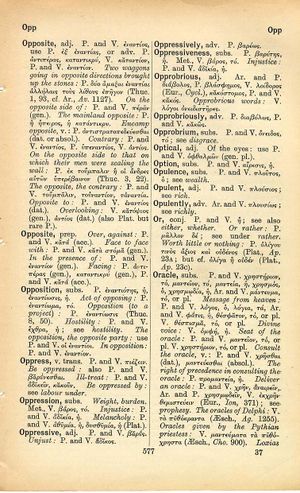opposite
Ῥᾷον παραινεῖν ἢ παθόντα καρτερεῖν → Patientiam suadere facile, non pati → Es spricht sich leichter zu, als stark zu sein im Leid
English > Greek (Woodhouse)
adj.
P. and V. ἐναντίος, use P. ἐξ ἐναντίας, or adv. P. ἀντιπέρας, καταντικρύ, V. καταντίον, P. and V. ἐναντίον. Two waggons going in opposite directions brought up the stones: P. δύο ἅμαξαι ἐναντίαι ἀλλήλαις τοὺς λίθους ἐπῆγον (Thuc. 1, 93, cf. Ar., Av. 1127). On the opposite side of: P. and V. πέραν (gen.). The mainland opposite: P, ἡ ἤπειρος, ἡ κατάντικρυ. Encamp opposite, v.:P. ἀντιστρατοπεδεύεσθαι (dat. or absol.). Contrary: P. and V. ἐναντίος, P. ὑπεναντίος, V. ἀντίος. On the opposite side to that on which their men were scaling the wall: P. ἐκ τοὔμπαλιν ἢ οἱ ἄνδρες αὐτῶν ὑπερέβαινον (Thuc. 3, 22). The opposite, the contrary: P. and V. τοὔμπαλιν, τοὐναντίον, τἀναντία. Opposite to: P. and V. ἐναντίος (dat.). Overlooking: V. κατόψιος (gen.), ἀντίος (dat.) (also Plat. but rare P.). prep. Over, against: P. and V. κατά (acc.). Face to face with: P. and V. κατὰ στόμα (gen.). In the presence of: P. and V. ἐναντίον (gen.). Facing: P. ἀντιπέρας (gen.), καταντικρύ (gen.), P. and V. κατά (acc.).
Latin > French (Gaffiot 2016)
oppŏsĭtē (oppositus), adv., en opposition : Boet. Anal. pr. 2, 8.

